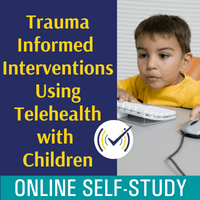Trauma-Informed and Trauma-Focused Interventions Using Telehealth With Children, Youth, and Their Families
1.5 CE Credits available for behavioral health clinicians, including Play Therapists
The goal of this training is for participants to distinguish among some of the most commonly used and widely researched trauma-focused interventions, including play therapy, in working with children and youth clients who present with acute, chronic, or complex trauma. The training will primarily expand the participants’ skills on telehealth adaptations of trauma-focused and trauma-informed interventions in working with children and youth clients. Given the context of inequities in the use of telehealth and the digital divide, this training will also integrate telehealth adaptations of some culturally-adapted trauma-focused interventions in working with Black, Indigenous, and People of Color (BIPOC) clients.
- Trauma-Informed And Trauma-Focused Interventions Using Telehealth With Children, Youth, And Their Families
- Description
- Learning Objectives
- Instructor
- CE Hours
- How to Complete the Course and Earn CEs
- Course Policies
- Who Should Attend and Practice Level
- Teaching Methods
- Course Availability
Select each tab above to view specific details of this course
The goal of this training is for participants to distinguish among some of the most commonly used and widely researched trauma-focused interventions in working with children and youth clients who present with acute, chronic, or complex trauma. The training will primarily expand the participants’ skills on telehealth adaptations of trauma-focused and trauma-informed interventions in working with children and youth clients. Given the context of inequities in the use of telehealth and the digital divide, this training will also integrate telehealth adaptations of some culturally-adapted trauma-focused interventions in working with Black, Indigenous, and People of Color (BIPOC) clients.
This course was recorded January 21, 2022 and consists on 95 minutes of instruction.
Upon completion of this training professionals will be able to do the following:
- Identify and describe at least two clinical considerations when using telehealth and tele-play therapy for working with clients exposed to trauma and/or experiencing ongoing trauma.
- Appraise the applicability of at least two core elements of trauma-focused interventions, including play therapy, in engaging behavioral health clients in telehealth.
- Illustrate at least two ways of addressing telehealth inequities and culturally-adapting trauma-focused interventions when working with BIPOC clients.
Ritchie Rubio Ph.D. Clinical Psychologist
Dr. Rubio works as a clinical child psychologist, play and expressive arts therapist, researcher-storyteller, program evaluator, statistical consultant, data analyst, telehealth trainer/consultant, and associate professor/lecturer in a variety of clinical and academic settings including public health systems, universities, pediatric hospitals, community mental health settings, schools, and research institutes in three countries: the Philippines, U.S.A., and New Zealand. He moved from the Philippines at the age of 25, completed his Ph.D. in Clinical Psychology with a Child and Family emphasis from the California School of Professional Psychology (CSPP) through a Ford Foundation International Fellowship Program (IFP) grant. He is currently the Director of Practice Improvement and Analytics of the Children, Youth, and Families System of Care (CYF-SOC) Behavioral Health Services (BHS) at the San Francisco Department of Public Health in California, USA. In that role, he plans and coordinates a clinical practice improvement and evaluation program focused on identifying best trauma-informed and diversity-responsive practices; and utilizing implementation science to design and strengthen clinical assessment and interventions. He is also an adjunct Associate Professor at the Counseling Psychology programs of the University of San Francisco and the Berkeley Wright Institute. He teaches courses such as Research and Statistics; Crisis and Trauma Counseling; Neuroscience; Child and Adolescent Counseling; Family Violence and Protection; Individual, and Family Development; and Clinical Assessment and Measures. His clinical work was/is primarily with immigrant and multicultural children/youth and their families. He mostly integrates psychodynamic, attachment, family systems, multicultural, expressive arts, play therapy, and CBT orientations.
Credit Hours: This course consists of 1.5 credit hours for behavioral health clinicians, including Play Therapists.
Counselors: Telehealth Certification Institute, LLC has been approved by NBCC as an Approved Continuing Education Provider, ACEP No, 6693. Programs that do not qualify for NBCC credit are clearly identified. Telehealth Certification Institute, LLC is solely responsible for all aspects of the programs.
Telehealth Certification Institute, LLC is recognized by the New York State Education Department's State Board for Mental Health Practitioners as an approved provider of continuing education for licensed mental health counselors. #MHC-0048. Approval renewal date: 1/31/2023
Marriage and Family Therapists: Many MFT licensing boards accept our courses or one of the approvals which we have from professional associations. You can check with your board to determine if this course would be accepted by your licensing board.
Social Workers: Telehealth Certification Institute LLC, #1609, is approved to offer social work continuing education by the Association of Social Work Boards (ASWB) Approved Continuing Education (ACE) program. Organizations, not individual courses, are approved as ACE providers. State and provincial regulatory boards have the final authority to determine whether an individual course may be accepted for continuing education credit. Telehealth Certification Institute LLC maintains responsibility for this course. ACE provider approval period: 05/02/2021 – 05/02/2024. Social workers completing this course receive 1.5 clinical continuing education credits.
Telehealth Certification Institute, LLC is recognized by the New York State Education Department's State Board for Social Work as an approved provider of continuing education for licensed social workers #SW-0435. Approval renewal date: 2/28/2023
Addiction Professionals: Telehealth Certification Institute is an approved provider of continuing education by NAADAC, The Association for Addiction Professionals, provider #193104, effective 02/23/2021. Full attendance is required; no partial credit will be awarded for partial attendance.
Play Therapists: Telehealth Certification Institute LLC has been approved as a continuing education provider by the Association for Play Therapy: APT Approved Provider 21-633. Per the Association for Play Therapy (APT), play therapy training may not be awarded to non-mental health professionals. APT alone holds the right to accept or deny any continuing education training at its discretion. This course qualifies for 1.5 non-contact play therapy continuing education hours.
Psychologists: Telehealth Certification Institute LLC is approved by the American Psychological Association to sponsor continuing education for psychologists. Telehealth Certification Institute LLC maintains responsibility for this program and its content.
Telehealth Certification Institute, LLC is recognized by the New York State Education Department’s State Board for Psychology as an approved provider of continuing education for licensed psychologists #PSY-0128. Effective 8/31/2021 – 8/31/2024
Art Therapists: Telehealth Certification Institute, LLC is recognized by the New York State Education Department's State Board for Mental Health Practitioners as an approved provider of continuing education for licensed creative arts therapists #CAT-0093. 7/21/2021 – 7/31/2024
Other Professionals: This activity qualifies for 90 minutes of instructional content as required by many national, state and local licensing boards and professional organizations. Retain your certificate of completion and contact your board or organization for specific filing requirements.
This is a non-interactive, self-study course.
To receive your certificate of completion you must complete the course in its entirety.
Online courses are completed by registering, logging in, navigating to your course using the menu (My Courses – the Course Title), completing all of the modules, completing and passing the post-test, and completing the course evaluation.
Live Webinar courses are completed by registering, logging in to this website, navigating to your course using the menu (My Courses – the Course Title), attending the full course via webinar, submitting your attendance, and completing the post-test and course evaluation online.
Psychologists and other professionals seeking CE credit through our approval with the American Psychological Association are asked, but not required, to complete the course evaluation before obtaining their certificate of completion, however passing a post-test for online self-study courses, and submitting one's attendance for live on-site and live webinars is required.
You can receive your certificate of completion by logging onto this website, navigating to the course using the menu (My Courses – the Course Title), scroll to the bottom of your course, and click on your certificate to either download it or print it.
Directions for completing a course can be found by clicking here.
Accommodations for Individuals with Disabilities
Click here to view our Accommodations for Individuals with Disabilities.
Cancellation Policy
Refunds are offered within the first 30 days for courses which have not been completed. There is a $25 service fee for refunds.
Grievance Policy
This course is intended for clinicians who provide behavioral health services.
Practice level: Intermediate
Teaching methods for this course include recorded lectures, videos, a post-test, and a course evaluation. The course may include required reading.
You have six months to access online courses from the time of purchase.

Ritchie Rubio
Ph.D.
Dr. Rubio works as a clinical child psychologist, play and expressive arts therapist, researcher-storyteller, program evaluator, statistical consultant, data analyst, telehealth trainer/consultant, and associate professor/lecturer in a variety of clinical and academic settings including public health systems, universities, pediatric hospitals, community mental health settings, schools, and research institutes in three countries: the Philippines, U.S.A., and New Zealand. He moved from the Philippines at the age of 25, completed his Ph.D. in Clinical Psychology with a Child and Family emphasis from the California School of Professional Psychology (CSPP) through a Ford Foundation International Fellowship Program (IFP) grant. He is currently the Director of Practice Improvement and Analytics of the Children, Youth, and Families System of Care (CYF-SOC) Behavioral Health Services (BHS) at the San Francisco Department of Public Health in California, USA. In that role, he plans and coordinates a clinical practice improvement and evaluation program focused on identifying best trauma-informed and diversity-responsive practices; and utilizing implementation science to design and strengthen clinical assessment and interventions. He is also an adjunct Associate Professor at the Counseling Psychology programs of the University of San Francisco and the Berkeley Wright Institute. He teaches courses such as Research and Statistics; Crisis and Trauma Counseling; Neuroscience; Child and Adolescent Counseling; Family Violence and Protection; Individual, and Family Development; and Clinical Assessment and Measures. His clinical work was/is primarily with immigrant and multicultural children/youth and their families. He mostly integrates psychodynamic, attachment, family systems, multicultural, expressive arts, play therapy, and CBT orientations.




The course was so informative and I was glued to my screen for the entire duration. I received so much knowledge concerning ethics in telehealth and I am greatly encouraged to read about all the standards and policies that pertain to my practice. Thank you!.